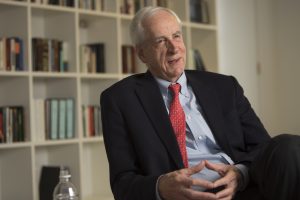
Photo: Robert Barker/UP
My first thought on coming back to Cornell is that I regret the circumstances: Beth Garrett’s death was a sad occasion for all of us. In her too-brief time here, Beth won many friends and supporters, and she has left a large hole in the fabric of our university.
It is our job now, collectively and collaboratively, to help repair the fabric Cornell has woven so successfully for more than a century and a half. For that task, we need good will and good work from everyone in our community, across all our campuses.
As I return after five years in Washington, D.C., Cornell appears more remarkable than ever: we have a faculty that is immensely strong, a superb student body, a committed and extremely capable staff, and, simply put, the most loyal and effective alumni enjoyed by any university in the world. It is worth emphasizing that Cornell is one of America’s premier research universities, and that this country has, in quality and in number, the finest such universities in the world. I remark on those facts because today these very institutions confront a great deal of public scrutiny and criticism. In my position at the Association of American Universities I saw much of this fault-finding up close: complaints by governors, legislators, and members of the press about student debt, high tuition, political correctness, campus protests, bloated staffs, and a litany of other charges. American research universities today lead the world by a wide margin, and have a greater impact on American culture and our economy than ever before.
While there is some truth about some universities in each of these accusations, they exaggerate the faults and miss the main point: American research universities today lead the world by a wide margin, and have a greater impact on American culture and our economy than ever before. It is no exaggeration to say that our research universities remain among the most prized and envied institutions in the world. Other countries send their students to us for higher education, export their best faculty to our labs and libraries for research and scholarship, and seek us out as partners and mentors in building new campuses and programs. Cornell is a leading model of this global role: it is a magnet for talent from around the world.
Here are a few recent data points illustrating Cornell’s global role and reputation:
- Drawing from 44,966 applications, the largest pool in our history, the University offered admission this spring to a diverse and superbly talented group of prospective first-year students. They come from all fifty states, several U.S. territories, and eighty-five other countries; based on citizenship, they represent 104 countries from outside the U.S.
- Over the past three years we have hired an annual average of eighty-two new tenured or tenure-track faculty for the Ithaca campus and Cornell Tech, and an average of eightytwo such faculty (and fifty-three non-tenured/non-tenure-track faculty) a year for Weill Cornell Medicine. These new faculty include outstanding researchers, scholars, clinicians, teachers, and mentors drawn here from around the world—and they, in turn, are making Cornell an even greater magnet for talent on a global scale.
- Mindful that the cost of education is an issue for all research universities, Cornell has maintained its commitment to access for deserving students, regardless of their ability to pay. At the same time it has made deliberate efforts to reduce expenditures that do not contribute to the quality and value of a Cornell education. Our extraordinary staff have played a major role in the effort to contain costs. Last fall, for example, members of the staff suggested 545 ways to improve processes and procedures. We have already implemented 120 of their proposals, with another 220 items in process.
As we move forward, as we must, to strengthen the fabric of our university, the good will and good work of Cornellians everywhere will be ever more valuable—and ever more valued. It is a pleasure to be back, and to join you in the task of sustaining and advancing Cornell’s leadership as one of world’s greatest research universities.
Hunter R. Rawlings III, Interim President


